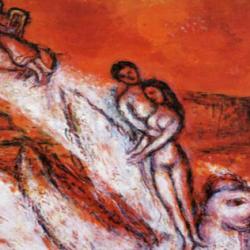The romantic approach in the Song of Songs mimics the liturgical approach of Bride Israel to her Husband in sacrificial worship. She is spiced and fragrant, so the King can delight in her aroma. He inspects her and finds her “flawless” (4:7), and draws her near to taste her (4:10-11), draws her near to the garden to eat and drink (5:1). That is the sequence of sacrifice: A flawless animal is ishshah or “bridal food,” as James Jordan has noted; the animal is turned to fragrant smoke as food for Yahweh.
But there’s another sacrificial sequence going on in the Song as well.
The bride is a “palm tree” ( tamar ) and the lover wants to climb her to take the fruit that is at her height. The verb for “climb” is alah , which means “to ascend” and which is the root of the word for ascension offering, olah . Ascending the tree is a sacrificial movement: Smoke goes up to heaven, and tree-climbers go toward the sky; the temple is a “forest of trees,” a grove of Lebanon’s cedars, so entering the temple and ascending to the Most Holy Place might be described as an ascent to the height of a forest. The lover wants to ascend his “palm tree,” and the cedar walls of the temple are carved with palm trees, among other things (1 Kings 6:29, 32, 35; 7:36). Walking through the temple is an ascent; it would seem to be an ascent up a palm tree.
Sacrificial smoke takes the animal representative into the “grove” where the worshiper cannot go; through the animal, the worshiper climbs the tree into the Most Holy Place, to enjoy the fruits that Yahweh offers there, fr in His presence is fullness of joy and delights forevermore.
Then we allegorize, and we realize that the lover is ascending the tree of the beloved. That is, this is not, or not just, a description of the worshiper approaching Yahweh, but a description of a male lover approaching his beloved, who stands tall and slender and fruitful as a palm tree. That is, Yahweh ascends the tree to gather the fruit of the beloved.
And how can we say that without pressing the allegory Christologically? Jesus is Yahweh incarnate, ascending the tree of the cross, offering Himself as a pleasing aroma to His Father. He is also Yahweh incarnate, ascending the tree of His bride so that he can enjoy her pleasant fruits. Why does Jesus go to the cross? For the joy set before Him, and in the light of the Song this is the joy of love consummated, the joy of clusters of dates and grapes which He gathers from His beloved, the fruits of the Spirit, the fruits of His vineyard.











